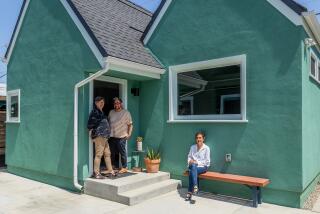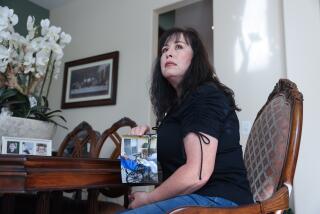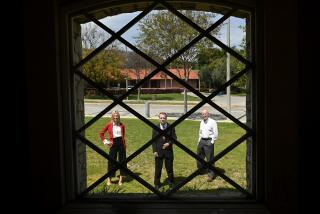Handrail for Elderly Mom Is a Must
- Share via
Question: I live in an 18-unit condominium complex in Glendale that was built in the 1960s. My 82-year-old mother lives with me, and she can no longer walk down the three front steps of my condo without assistance.
For more than a year I have requested that the board install a handrail, and I offered to pay for the railing. The board of directors keeps turning down my requests with no explanation.
No other unit has an in-ground type railing (there is no wall to attach it to) leading out the front. Do I have any rights in this area, and what happens if my mother falls and injures herself?
Answer: It’s possible the board has not considered the ramifications its actions may have on the other homeowners.
Recognition of the rights of the physically impaired was included in the Davis-Stirling Act in section 1360, which says that, subject to the provisions of the governing documents, the owner of the separate interest may “modify a unit in a condominium project, at the owner’s expense, to facilitate access for persons who are blind, visually handicapped, deaf, or physically disabled, or to alter conditions which could be hazardous to these persons. These modifications may also include modifications of the route from the public way to the door of the unit for the purposes of this paragraph if the unit is on the ground floor or already accessible by an existing ramp or elevator.”
If pertinent, building codes and other requirements for the handrail set out in section 1360 have to be followed, but unless the board has what the law calls good cause, the association may not deny your request. The only conditions an association may attach to your request are that the modification be consistent with safety and aesthetics and that the modification not prevent reasonable passage by other residents. After the person who requires the handrail or other modification no longer lives in the unit, the association can require removal of the modification.
Though the act provides no penalty for a board that breaks the law by repeatedly denying your request, it could mean civil liability for all the homeowners if your mother is injured and the board was found not to have good cause.
State May Have to Resolve Dispute Over Repairs
Q: I own a planned-unit development lot within a common-interest development in Costa Mesa. My deed gave me an easement for parking under a carport that is built in the common area.
The board of directors wants me to repair a post that is sinking on the common area lot. I didn’t damage the post and my measurements show that the post is not in my parking easement area. I told the homeowners association that I do not own the common area, and the association threatened to sue me if I don’t fix the sinking post. What should I do?
A: The association is responsible for repairs to the common areas, and the homeowner is responsible for repairs to a separate interest.
Section 1364 of the Davis-Stirling Act says that “unless otherwise provided in the declaration of a common interest development, the association is responsible for repairing, replacing or maintaining the common areas, other than exclusive use common areas, and the owner of each separate interest is responsible for maintaining that separate interest and any exclusive use common area appurtenant to the separate interest.”
Your problem may be as simple as determining whether the post is part of the exclusive use common area or whether the right to park is the exclusive use.
Because of the difficulties you are experiencing and the problems with your board, you should send a letter to your association saying that you believe the post is common ground and that the association should pay to have it repaired. Require that your board respond to you in writing.
If the board disagrees with you, make a claim on your association’s insurance policy. If the board will not help you with this, go directly to the agent or to the insurance company for a claim form.
If the insurance agent will not assist you, go to the California Department of Insurance Web page (https://www.insurance.ca.gov) and download a complaint form (click on “Insurance Fraud Reporting Forms”), complete it and send in. There is no charge for filing a complaint with a government agency.
Finally, if you choose to repair it yourself or if the association forces you to repair it and you still believe that it is the association’s responsibility based on the governing documents, save all your receipts and proof of payment. Use the denial by your association as the basis for a claim on your own insurance policy; if it is denied, or if the cost of the repair is less than $5,000, consider going to Small Claims Court.*
Stephen Glassman is a writer and an attorney in private practice specializing in corporate and business law. Donie Vanitzian is a writer and arbitrator and manages commercial property. Both live in common interest developments and have served on various association boards. Please send questions to: Common Interest Living, P.O. Box 451278, Los Angeles, CA 90045 or e-mail your queries to: CIDCommonS[email protected].


